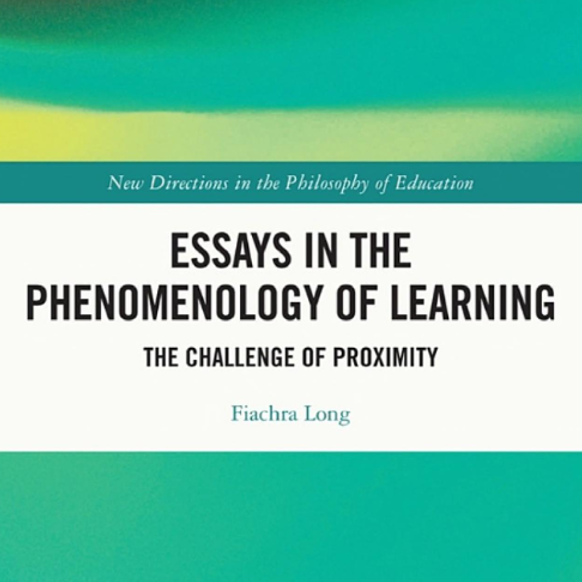Book Launch: Essays in the Phenomenology of Learning: The Challenge of Proximity

On December 1, Fiachra Long launched his new book entitled Essays in the Phenomenology of Learning: The Challenge of Proximity with Routledge in the New Directions in the Philosophy of Education Series.
This book describes how different philosophers represent the ‘proximity’ moment in learning situations. The term ‘proximity’ draws on Vygotsky’s celebrated Zone of Proximal Development (ZPD) but broadens its psychological focus. Given that phenomenology is the study of ‘appearances’, this book examines how ‘proximate’ appearances enter the learning process. If we think that what appears before learners is important or worth studying, then we need to ask about how close these appearances are to a learner’s actual interest.
These essays can be read as stand-alone pieces or as contributory perspectives to a larger argument about the relevance of selfhood to learning. Each essay draws on the work of a major thinker whose writings have shed light on human learning. These include, Socrates, Husserl, Heidegger (2 essays), Merleau-Ponty, Foucault, Donald W. Winnicott and Axel Honneth. Not all of these thinkers could be called phenomenologists, but the writings of each are concerned to define ‘proximate’ appearances. The book shows how these appearances might define the learning process.
Questions such as ‘how am I to live?’ may seem abstract and more distant than a foreground question like ‘how am I to do this geometry problem? ‘How am I to write a sentence?’ ‘How am I to say a few French words?’ And yet they are far from abstract when parents sense that their child plays alone in the schoolyard or if their child has lost enthusiasm for going to school. Then questions that once seemed distant rise up as unsuspected proximate concerns that children may not be able to express. The child might not say ‘why do people not play with me in the yard?’ or ‘how am I to fit in?’ or ‘how do you do these maths problems?’ or ‘why do I find all this so boring?’ Language is not always on hand to express such proximate concerns.
And yet parents want their children to have a sense of fulfilment in what they do and hope that they find their way in the world. They presume many values that lie concealed such as the belief that the world is good and truthful. These values express what schooling is about but in a more proximate sense than educational objectives usually express.
Once we recognize the importance of a field of value that is more proximate than curricular or pedagogical issues, we then wonder how this field presents itself in educational settings. Different philosophers who study the way things appear have suggested different entry points for a child’s interest. This book presents a number of these entry points and argues for a foundation of identity that is closer to our reality than our sovereign selves.
School of Education
Scoil an Oideachais
Contact us
Leeholme, O'Donovan's Road, Cork, Ireland
